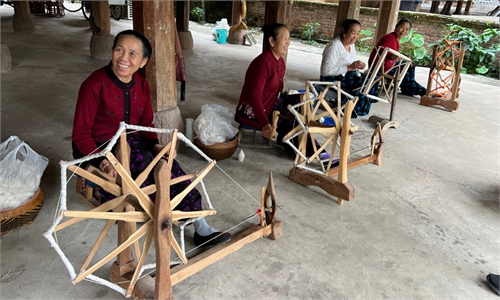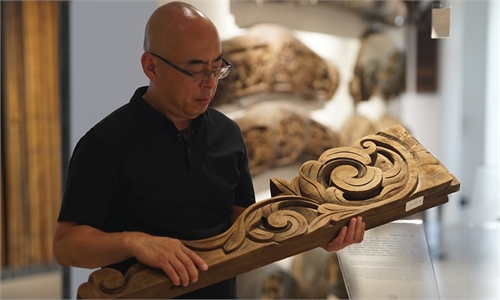ARTS / CULTURE & LEISURE
Long-term tourism takes root in Yunnan
Come to stay

The Xishuangbanna Dai Ethnic Group Garden in Xishuangbanna, Southwest China's Yunnan Province. Photo:VCG
37-year-old Teng Jinrong was born and raised in Wenzhou, East China's Zhejiang Province, yet he has been living in Menghai county, within the Xishuangbanna Dai Autonomous Prefecture in Southwest China's Yunnan Province, since 2012.
Previously, his family had traveled to Menghai several times, which eventually led to their decision of moving there. His parents started out by growing dendrobium officinale, a type of herb used in traditional Chinese medicine, known as tiepishihu. He later opened a store selling Chinese Pu'er tea.
"The breathtaking scenery, comfortable weather and the slow pace of life made me feel at home. And this place has indeed become my home now. I made friends with teachers who taught me how to brew the best Pu'er tea, and enjoy the diverse local customs and culture. Some visitors are drawn here for short visits, but they later opt for longer stays," Teng told the Global Times.
Immersive experiences
According to data from 2024, nearly 4 million long-term visitors chose to settle in Yunnan, attracted by the chance to enjoy a slower pace of life and deeply engage with the region's historic villages and terraced landscapes, reported Xinhua News Agency.
Yunnan plans to build 3,000 specially designated villages over the next three years. These villages aim to offer wellness retreats, cultural experiences, educational activities, and senior-friendly living options to cater to the rising interest in long-term stays, announced local tourism authorities at a promotional event for Yunnan tourism held in Beijing on March 12.
According to the provincial authorities' work report released in January, Yunnan has set an ambitious goal of attracting 6 million long-stay visitors by 2025.
To keep pace with this rising trend, Yunnan is shifting away from conventional sightseeing tourism toward a more diverse, experiential approach. Being home to 25 indigenous ethnic minority groups, the province boasts a rich cultural heritage, which provides visitors with unique and immersive experiences.
"Take Menghai for instance, there is the traditional costume craft workshop of the Hani ethnic group. From headpieces, short pleated skirts to feather accessories and shell decorations, visitors can experience the culture of the Hani people through their brightly colored traditional clothing and the intricate needlework of Hani embroidery," said Teng.
Besides domestic migrants, Samuel Aberle from Kansas, US, has also been living in Menghai for seven years. Aberle told the Global Times that the clean air, the small-town feel, the friendly people, and a safe environment are among the reasons that he and his family love the place.
Aberle loves spending his leisure time trying out various outdoor activities and the local cuisine. Now a restaurant owner in Menghai, he loves making friends over a cup of tea, exchanging stories with his customers.
Warmth of daily living
According to a report released by the China Tourism Academy, travelers aged 20 to 40 account for about 60 percent of long-stay tourists, indicating that more and more young people are embracing this lifestyle. Young people from first- and second-tier cities are now leading this new trend, reported People's Daily.
Lu Boke, from Lixian county in Northwest China's Gansu Province, has also made Yunnan his home. Owner of a hostel in Jinghong city, he has welcomed many young people from major cities at his establishment, who come seeking a different way of living in Yunnan. Some are on vacation, some are taking a gap period between jobs, and some are digital nomads.
Young people can take a break from the hustle and bustle in the cities, slow down and better appreciate life here. Besides making friends from different backgrounds, we also offer a lot of immersive activities, Lu told the Global Times.
"For instance, sometimes we have a barbecue, prepare traditional hand-eaten rice platters, sticky rice or other local delicacies together outside, in the beautiful surrounding forests. Sitting on the grass together, using banana leaves as table cloths, is a very special experience.
"At times, we host cooking workshops where chefs guide participants in preparing traditional dishes from local ethnic minority cuisines," said Lu.
A growing number of visitors have developed a deep connection with their second home in Yunnan, tapping into local resources to launch creative ventures, run cafés, or engage in hostels or homestays like Lu, bringing fresh vitality to the rural economy.
"As more and more people come to Yunnan to open hostels or homestays, the industry has been innovating and upgrading. Homestays have been exploring and developing their unique characteristics, like a focus on art, ethnic features or young," said Lu.
Meanwhile, government investments in infrastructure development have enhanced the villages' appeal as a destination. Take Menghai for example, Teng noticed significant improvement in terms of road upgrades and sustainability.
"I started e-commerce through livestreaming. With the express delivery development, everything is so convenient," said Teng.
"In Yunnan, you'll always find unexpected surprises," said Wang Ning, secretary of the Communist Party of China (CPC) Yunnan Provincial Committee, in a reply letter to netizens in March.
Wang also welcomed netizens to embrace the Yunnan lifestyle: "Come and let the wind clear your mind, visit villages where water carries laughter and blessings, and gather around farmhouse fire pits to share the sweetness of life under the stars."
"I'd like to invite everyone to come live in Yunnan for a while and experience a life that begins in nature and settles into the warmth of daily living," Wang wrote in his letter.

Samuel Aberle works at his restaurant in Menghai county, Xishuangbanna Dai Autonomous Prefecture in Southwest China's Yunnan Province. Photo: Courtesy of Menghai Integrated Media Center



